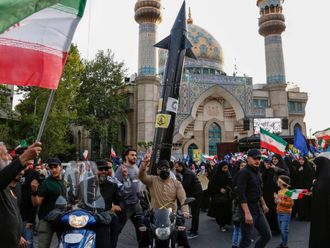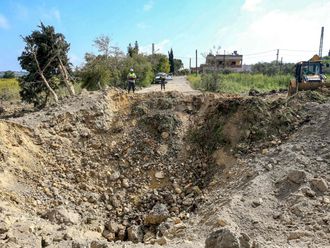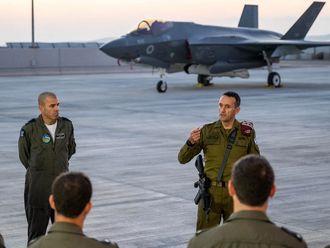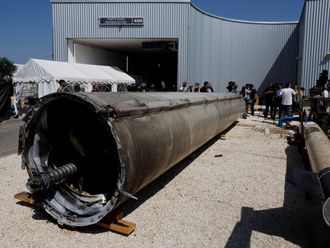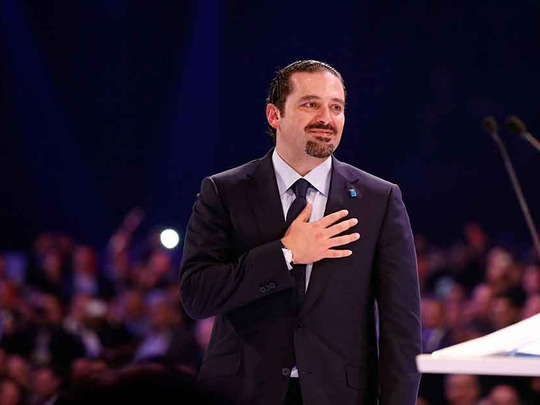
Beirut: Sa'ad Hariri received a triumphal reception at the Biel Conference Center on Saturday evening where the country’s elite gathered to commemorate the 10th anniversary of an assassination that shook Lebanon to its core.
Hariri, a former prime minister, delivered a riveting allocution that will long be analyzed for its content, which revolved around his late father’s nationalist policies.
Law enforcement officials estimated that approximately 12,000 individuals were in attendance, including leading politicians, foreign diplomats accredited to Beirut, and scores of young Future Movement members. Acting President and Prime Minister Tammam Salam, former President of the Republic, Michel Sulaiman, and most March 14 coalition tenors were present.
There were, however, notable absences, including the Speaker Nabih Berri, who was represented by the affable Abdul Latif Al Zayn, former President Amine Gemayel as well as his son Sami [although Nadim Gemayel, the son of former President Bashir Gemayel was present], and Progressive Socialist Party head Walid Junblatt, all of whom rose to prominence after the 2005 assassination and lend their voices to the “Cedar Revolution.” Not surprisingly, neither the Free Patriotic Movement’s Michel Aoun nor any Hezbollah officials, attended either.
Even moderate Shi'ite leaders, like Abdul Hamid Baydun and Ahmad Al Asaad were noticeably missing, most likely because they did not approve of the recent dialogue between Future and Hezbollah.
In contrast to Hezbollah gatherings where speeches are often accompanied by war chants, this commemoration was filled with enchanting music that glorified life. A subtle message was telegraphed in the choreography as musicians, including an Arabic rap song that appealed to youngsters, underscored how patriotism was preferable to martyrdom. The entire program was remarkable in its positive, even festive, overtones that lifted spirits before Hariri delivered his remarks.
Not known for his fiery deliveries, Hariri rose to the occasion, as he spoke clearly and forcefully. He first send his condolences on the January 23 death of King Abdullah Bin Abdul Aziz, thereby making a direct link with Saudi Arabia, a country that stood by Lebanon through thick and thin.
He then recalled his father’s murder and what could have motived the killers—to silence a major symbol of reconciliation and success—before turning to the ongoing Arab earthquakes that toppled governments, ushered in chaos, and otherwise dragged the Arab World into its current doldrums.
“After you,” Hariri spoke to the memory of his father, Israel “waged the dirtiest war against Lebanon in 2006,” when the “state became a hostage for an equation usurping the decisions of war and peace.”
“After you,” he continued, “states and regimes collapsed, societies weakened and deep-rooted cities turned into swamps of strife and terrorism.” “After you,” he hammered, Syrian President “Bashar Al Assad managed to smash Syria over the heads of the Syrian people and he managed to open the border for the spread of the forces of extremism and perversity and the displacement of 10 million Syrian citizens.”
This was a direct reference to an oft-repeated allegation that Damascus was upset with Rafik Hariri and may have orchestrated his assassination, going so far as to tell the slain leader that he, Bashar Al Assad, “would destroy Lebanon” over Hariri’s head.
“After you,” the son noted, “rulers in Iraq made bigotry the basis of their governance and Yemen took off the dress of happiness.” “After you,” he lamented, “most Arabs left Palestine to face its fate and after you Libya fell in the hands of militias.” He concluded this soliloquy by pledging to never “surrender to despair after you and we won’t hand over Rafik Hariri’s dream to terrorism and crime.”
Sa'ad Hariri then turned his attention to the value of his late father’s project, which was to protect Lebanon from all foes, as he explained why he engaged in a dialogue with Hezbollah. Without mincing his words, he emphasised that dialogue was not a “political luxury” or a step to leave behind the points of contention.
“Dialogue,” he contended, was a necessity to prevent a renewed civil war, because four major disputes separated Sunnis and Shiites in the country: the fate of five accused Hezbollah members who are on trial—in abstentia—at the Special Tribunal for Lebanon; the party’s participation in the Syrian civil war; the state’s exclusive possession of arms that required Hezbollah to surrender its weapons; and the latest declarations about joining Lebanon to military fronts in Syria, Palestine and Iran.
In fact, Hariri categorically rejected Hezbollah’s decision to speak for Lebanon or to consider it part of a certain axis. “The majority of the Lebanese people says no to this axis and to any axis,” he underscored, adding: “Lebanon is not a card in anyone’s hand and the Lebanese are not a bargaining chip.”
Hariri closed his remarks with what were four key declarations that will long be analyzed for their critical consequences on the country.
First, he bewailed parliament’s unwillingness to elect a head of state, and regretted that 24 ministers in the cabinet—which he accentuated could not possibly replace a president—ought to simply involve themselves in caretaking duties because the cabinet, according to the Constitution, “can only assume the president’s powers in extraordinary cases and the current void is not the result of extraordinary circumstances but rather the result of political intransigence and a power struggle.”
Second, he reiterated his full and unwavering backing of the Lebanese Armed Forces and the Internal Security Forces as they defended the country against all foes, whether Christian or Muslim, Sunni, or Shiites. Towards that end, he cautioned that the Lebanese ought to be alert to avoid chaos and sectarian segregation.
Third, he pounded the call on Hezbollah to end its “madness” and withdraw its militiamen from Syria, and to stop pretending that the Lebanese backed the party’s involvement there, precisely to prevent additional blazes from reaching into the country.
Fourth, and perhaps most important, Hariri defined his own understandings of right and wrong when he categorically disowned extremism. “There can be no middle ground between moderation and extremism,” he declared, adding: “I am an extremist. An extremist for the State and its institutions, for moderation, and for national unity.” Hariri closed his remarks with an appeal for the establishment of a secular state, one that was firmly rooted in law, national institutions, and tolerance.


